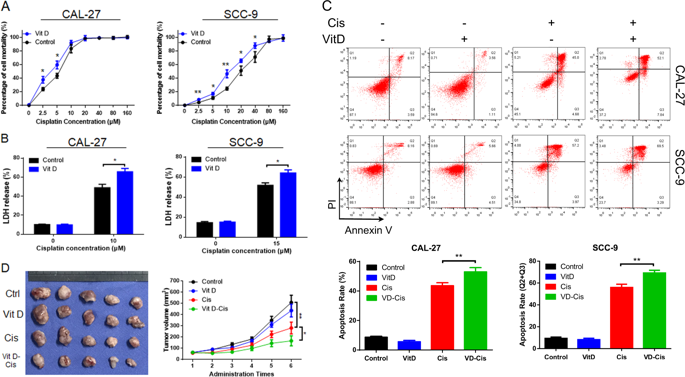当前位置:
X-MOL 学术
›
Cell Death Dis.
›
论文详情
Our official English website, www.x-mol.net, welcomes your
feedback! (Note: you will need to create a separate account there.)
Vitamin D promotes the cisplatin sensitivity of oral squamous cell carcinoma by inhibiting LCN2-modulated NF-κB pathway activation through RPS3.
Cell Death & Disease ( IF 8.1 ) Pub Date : 2019-12-09 , DOI: 10.1038/s41419-019-2177-x Zixian Huang 1, 2 , Yin Zhang 1, 3 , Haigang Li 4 , Yufeng Zhou 5 , Qianyu Zhang 1, 2 , Rui Chen 1, 2 , Tingting Jin 1, 2 , Kaishun Hu 1, 3 , Shihao Li 2 , Yan Wang 2 , Weiliang Chen 2 , Zhiquan Huang 1, 2
Cell Death & Disease ( IF 8.1 ) Pub Date : 2019-12-09 , DOI: 10.1038/s41419-019-2177-x Zixian Huang 1, 2 , Yin Zhang 1, 3 , Haigang Li 4 , Yufeng Zhou 5 , Qianyu Zhang 1, 2 , Rui Chen 1, 2 , Tingting Jin 1, 2 , Kaishun Hu 1, 3 , Shihao Li 2 , Yan Wang 2 , Weiliang Chen 2 , Zhiquan Huang 1, 2
Affiliation

|
Chemoresistance is a major cause of cancer progression and the mortality of cancer patients. Developing a safe strategy for enhancing chemosensitivity is a challenge for biomedical science. Recent studies have suggested that vitamin D supplementation may decrease the risk of many cancers. However, the role of vitamin D in chemotherapy remains unknown. We found that vitamin D sensitised oral cancer cells to cisplatin and partially reversed cisplatin resistance. Using RNA-seq, we discovered that lipocalin 2 (LCN2) is an important mediator. Cisplatin enhanced the expression of LCN2 by decreasing methylation at the promoter, whereas vitamin D enhanced methylation and thereby inhibited the expression of LCN2. Overexpression of LCN2 increased cell survival and cisplatin resistance both in vitro and in vivo. High LCN2 expression was positively associated with differentiation, lymph node metastasis, and T staging and predicted a poor prognosis in oral squamous cell carcinoma (OSCC) patients. LCN2 was also associated with post-chemotherapy recurrence. Moreover, we found that LCN2 promoted the activation of NF-κB by binding to ribosomal protein S3 (RPS3) and enhanced the interaction between RPS3 and p65. Our study reveals that vitamin D can enhance cisplatin chemotherapy and suggests that vitamin D should be supplied during chemotherapy; however, more follow-up clinical studies are needed.
中文翻译:

维生素 D 通过 RPS3 抑制 LCN2 调节的 NF-κB 通路激活,从而促进口腔鳞状细胞癌对顺铂的敏感性。
化疗耐药是癌症进展和癌症患者死亡的主要原因。制定增强化学敏感性的安全策略是生物医学面临的挑战。最近的研究表明,补充维生素 D 可以降低多种癌症的风险。然而,维生素 D 在化疗中的作用仍不清楚。我们发现维生素 D 可使口腔癌细胞对顺铂敏感并部分逆转顺铂耐药性。使用 RNA-seq,我们发现脂质运载蛋白 2 (LCN2) 是一种重要的介质。顺铂通过降低启动子的甲基化来增强 LCN2 的表达,而维生素 D 则增强甲基化,从而抑制 LCN2 的表达。 LCN2 的过度表达在体外和体内均增加了细胞存活率和顺铂耐药性。 LCN2 高表达与分化、淋巴结转移和 T 分期呈正相关,并预测口腔鳞状细胞癌 (OSCC) 患者的不良预后。 LCN2 也与化疗后复发相关。此外,我们发现LCN2通过与核糖体蛋白S3(RPS3)结合促进NF-κB的激活,并增强RPS3和p65之间的相互作用。我们的研究表明维生素D可以增强顺铂化疗,建议化疗期间补充维生素D;然而,还需要更多的后续临床研究。
更新日期:2019-12-09
中文翻译:

维生素 D 通过 RPS3 抑制 LCN2 调节的 NF-κB 通路激活,从而促进口腔鳞状细胞癌对顺铂的敏感性。
化疗耐药是癌症进展和癌症患者死亡的主要原因。制定增强化学敏感性的安全策略是生物医学面临的挑战。最近的研究表明,补充维生素 D 可以降低多种癌症的风险。然而,维生素 D 在化疗中的作用仍不清楚。我们发现维生素 D 可使口腔癌细胞对顺铂敏感并部分逆转顺铂耐药性。使用 RNA-seq,我们发现脂质运载蛋白 2 (LCN2) 是一种重要的介质。顺铂通过降低启动子的甲基化来增强 LCN2 的表达,而维生素 D 则增强甲基化,从而抑制 LCN2 的表达。 LCN2 的过度表达在体外和体内均增加了细胞存活率和顺铂耐药性。 LCN2 高表达与分化、淋巴结转移和 T 分期呈正相关,并预测口腔鳞状细胞癌 (OSCC) 患者的不良预后。 LCN2 也与化疗后复发相关。此外,我们发现LCN2通过与核糖体蛋白S3(RPS3)结合促进NF-κB的激活,并增强RPS3和p65之间的相互作用。我们的研究表明维生素D可以增强顺铂化疗,建议化疗期间补充维生素D;然而,还需要更多的后续临床研究。











































 京公网安备 11010802027423号
京公网安备 11010802027423号